- Home
- Thomas Harris
Hannibal Page 26
Hannibal Read online
Page 26
“Can you do just one nut, with nothing to squeeze it against?” Barney said. He cracked two eggs on the rim of the blender and dropped them in.
“Can you?” Margot said, and handed him a walnut.
The nut lay in Barney’s open palm. “I don’t know.” He cleared the space in front of him on the bar and an orange rolled off on Margot’s side. “Oops, sorry,” Barney said.
She picked it up from the floor and put it back in the bowl.
Barney’s big fist clenched. Margot’s eyes went from his fist to his face, then back and forth as his neck corded with strain, his face flushed. He began to tremble, from his fist a faint cracking sound, Margot’s face falling, he moved his trembling fist over the blender and the cracking came louder. An egg yolk and white plopped into the blender. Barney turned the machine on and licked the tips of his fingers. Margot laughed in spite of herself.
Barney poured the smoothies into glasses. From across the room they might have been wrestlers or power lifters in two weight divisions.
“You feel like you have to do everything guys do?” he said.
“Not some of the dumb stuff.”
“You want to try male bonding?”
Margot’s smile went away. “Don’t set me up for a dick joke, Barney.”
He shook his massive head. “Try me,” he said.
CHAPTER
57
IN HANNIBAL’S House the gleanings grew as day by day Clarice Starling felt her way along the corridors of Dr. Lecter’s taste:
Rachel DuBerry had been somewhat older than Dr. Lecter when she was an active patron of the Baltimore Symphony and she was very beautiful, as Starling could see in the Vogue pictures from the time. That was two rich husbands ago. She was now Mrs. Franz Rosencranz of the textile Rosencranzes. Her social secretary put her on the line:
“Now I just send the orchestra money, dear. We’re away far too much for me to be actively involved,” Mrs. Rosencranz nee DuBerry told Starling. “If it’s some sort of tax question, I can give you the number of our accountants.”
“Mrs. Rosencranz, when you were active on the boards of the Philharmonic and the Westover School you knew Dr. Hannibal Lecter.”
A considerable silence.
“Mrs. Rosencranz?”
“I think I’d better take your number and call you back through the FBI switchboard.”
“Certainly.”
When the conversation resumed:
“Yes, I knew Hannibal Lecter socially years ago and the press has camped on my doorstep ever since about it. He was an extraordinarily charming man, absolutely singular. Sort of made a girl’s fur crackle, if you know what I mean. It took me years to believe the other side of him.”
“Did he ever give you any gifts, Mrs. Rosencranz?”
“I received a note from him on my birthdays usually, even after he was in custody. Sometimes a gift, before he was committed. He gives the most exquisite gifts.”
“And Dr. Lecter gave the famous birthday dinner for you. With the wine vintages keyed to your birth date.”
“Yes,” she said. “Suzy called it the most remarkable party since Capote’s Black and White Ball.”
“Mrs. Rosencranz, if you should hear from him, would you please call the FBI at the number I’ll give you? Another thing I’d like to ask you if I may, do you have any special anniversaries with Dr. Lecter? And Mrs. Rosencranz, I need to ask you your birth date.”
A distinct chill on the phone. “I would think that information was easily available to you.”
“Yes, ma’am, but there are some inconsistencies among the dates on your social security, your birth certificate and your driver’s license. In fact, none of them are the same. I apologize, but we’re keying custom orders on high-end items to the birthdays of Dr. Lecter’s known acquaintances.”
“‘Known acquaintances.’ I’m a known acquaintance now, what an awful term.” Mrs. Rosencranz chuckled. She was of a cocktail and cigarette generation and her voice was deep. “Agent Starling, how old are you?”
“I’m thirty-two, Mrs. Rosencranz. I’ll be thirty-three two days before Christmas.”
“I’ll just say, in all kindness, I hope you’ll have a couple of ‘known acquaintances’ in your life. They do help pass the time.”
“Yes, ma’am, and your birth date?”
Mrs. Rosencranz at last parted with the correct information, characterizing it as “the date Dr. Lecter is familiar with.”
“If I may ask, ma’am, I can understand changing the birth year, but why the month and day?”
“I wanted to be a Virgo, it matches better with Mr. Rosencranz, we were dating then.”
The people Dr. Lecter had met while he was living in a cage viewed him somewhat differently:
Starling rescued former U.S. Senator Ruth Martin’s daughter, Catherine, from the hellish basement of the serial killer Jame Gumb and, had Senator Martin not been defeated in the next election, she might have done Starling much good. She was warm to Starling on the telephone, gave her news of Catherine, and wanted her news.
“You never asked me for anything, Starling. If you ever want a job—”
“Thank you, Senator Martin.”
“About that goddamned Lecter, no, I’d have notified the Bureau of course if I heard from him, and I’ll put your number here by the phone. Charlsie knows how to handle mail. I don’t expect to hear from him. The last thing that prick said to me in Memphis was ‘Love your suit.’ He did the single cruelest thing anybody’s ever done to me, do you know what it was?”
“I know he taunted you.”
“When Catherine was missing, when we were desperate and he said he had information on Jame Gumb, and I was pleading with him, he asked me, he looked into my face with those snake eyes and asked me if I had nursed Catherine. He wanted to know if I breast-fed her. I told him yes. And then he said, ‘Thirsty work isn’t it?’ It just brought it all back suddenly, holding her as a baby, thirsty, waiting for her to get full, it pierced me like nothing I ever felt, and he just sucked down my pain.”
“What kind was it, Senator Martin?”
“What kind—I’m sorry?”
“What kind of suit did you have on, that Dr. Lecter liked.”
“Let me think—a navy Givenchy, very tailored,” Senator Martin said, a little piqued at Starling’s priorities. “When you’ve got him back in the slammer, come see me, Starling, we’ll ride some horses.”
“Thank you, Senator, I’ll remember that.”
Two phone calls, one on each side of Dr. Lecter, one showed his charm, the other his scales. Starling wrote down:
Vintage keyed to birthdays, which was already covered in her little program. She made a note to add Givenchy to her list of high-end goods. As an afterthought she wrote down breast-fed, for no reason she could say, and there was no time to think about it because her red phone was ringing.
“This is Behavioral Science? I’m trying to get through to Jack Crawford, this is Sheriff Dumas in Clarendon County, Virginia.”
“Sheriff, I’m Jack Crawford’s assistant. He’s in court today. I can help you. I’m Special Agent Starling.”
“I needed to speak to Jack Crawford. We got a fella in the morgue that’s been trimmed up for meat, have I got the right department?”
“Yes sir, this is the mea—yes, sir, you certainly do. If you’ll tell me exactly where you are, I’m on the way, and I’ll alert Mr. Crawford as soon as he’s through testifying.”
Starling’s Mustang got enough second-gear rubber out of Quantico to make the Marine guard frown at her, and wag his finger, and keep himself from smiling.
CHAPTER
58
THE CLARENDON County Morgue in northern Virginia is attached to the county hospital by a short air lock with an exhaust fan in the ceiling and wide double doors at each end to facilitate access by the dead. A sheriff’s deputy stood before these doors to keep out the five reporters and cameramen who crowded around him.
From beh
ind the reporters, Starling stood on her tiptoes and held her badge high. When the deputy spotted it and nodded, she plunged through. Strobe lights flashed and a sun gun flared behind her.
Quiet in the autopsy room, only the clink of instruments put down in a metal tray.
The county morgue has four stainless-steel autopsy tables, each with its scales and sink. Two of the tables were draped, the sheets oddly tented by the remains they covered. A routine hospital postmortem was in progress at the table nearest the windows. The pathologist and his assistant were doing something delicate and did not look up when Starling came in.
The thin shriek of an electric saw filled the room, and in a moment the pathologist carefully set aside the cap of a skull and lifted in his cupped hands a brain, which he placed on the scales. He whispered the weight into the microphone he wore, examined the organ in the scale pan, poked it with a gloved finger. When he spotted Starling over the shoulder of his assistant, he dumped the brain into the open chest cavity of the corpse, shot his rubber gloves into a bin like a boy shooting rubber bands and came around the table to her.
Starling found shaking his hand a bit crawly.
“Clarice Starling, Special Agent, FBI.”
“I’m Dr. Hollingsworth—medical examiner, hospital pathologist, chief cook and bottle washer.” Hollingsworth has bright blue eyes, shiny as well-peeled eggs. He spoke to his assistant without looking away from Starling. “Marlene, page the sheriff in cardiac ICU, and un-drape those remains, please, ma’am.”
In Starling’s experience medical examiners were usually intelligent but often silly and incautious in casual conversation, and they liked to show off. Hollingsworth followed Starling’s eyes. “You’re wondering about that brain?”
She nodded and showed him her open hands.
“We’re not careless here, Special Agent Starling. It’s a favor I do the undertaker, not putting the brain back in the skull. In this case they’ll have an open coffin and a lengthy wake, and you can’t prevent brain material leaking onto the pillow, so we stuff the skull with Huggies or whatever we have and close it back up, and I put a notch in the skull cap over both ears, so it won’t slide. Family gets the whole body back, everybody’s happy.”
“I understand.”
“Tell me if you understand that,” he said. Behind Starling, Dr. Hollingsworth’s assistant had removed the covering sheets from the autopsy tables.
Starling turned and saw it all in a single image that would last as long as she lived. Side by side on their stainless-steel tables lay a deer and a man. From the deer projected a yellow arrow. The arrow shaft and the antlers had held up the covering sheet like tent poles.
The man had a shorter, thicker yellow arrow through his head transversely at the tips of his ears. He still wore one garment, a reversed baseball cap, pinned to his head by the arrow.
Looking at him, Starling suffered an absurd burp of laughter, suppressed so fast it might have sounded like dismay. The similar positions of the two bodies, on their sides instead of in the anatomical position, revealed that they had been butchered almost identically, the sirloin and loin removed with neatness and economy along with the small filets that lie beneath the spine.
A deer’s fur on stainless steel. Its head elevated by the antlers on the metal pillow block, the head turned and the eye white as though it tried to look back at the bright shaft that killed it—the creature, lying on its side in its own reflection in this place of obsessive order, seemed wilder, more alien to man than a deer ever seemed in the woods.
The man’s eyes were open, some blood came from his lachrymal ducts like tears.
“Odd to see them together,” Dr. Hollingsworth said. “Their hearts weighed exactly the same.” He looked at Starling and saw that she was all right. “One difference on the man, you can see here where the short ribs were separated from the spine and the lungs pulled out the back. They almost look like wings, don’t they?”
“Bloody Eagle,” Starling muttered, after a moment’s thought.
“I never saw it before.”
“Me either,” Starling said.
“There’s a term for that? What did you call it?”
“The Bloody Eagle. The literature at Quantico has it. It’s a Norse sacrificial custom. Chop through the short ribs and pull the lungs out the back, flatten them out like that to make wings. There was a neo-Viking doing it in Minnesota in the thirties.”
“You see a lot of this, I don’t mean this, but this kind of stuff.”
“Sometimes I do, yes.”
“It’s out of my line a little. We get mostly straightforward murders—people shot and knifed, but do you want to know what I think?”
“I’d like very much to know, Doctor.”
“I think the man, his ID says Donnie Barber, killed the deer illegally yesterday, the day before the season started—I know that’s when it died. That arrow’s consistent with the rest of his archery equipment. He was butchering it in a hurry. I haven’t done the antigens on that blood on his hands, but it’s deer blood. He was just going to take what deer hunters call the backstrap, and he started a sloppy job, this short ragged cut here. Then he got a big surprise, like this arrow through his head. Same color, but a different kind of arrow. No notch in the butt. Do you recognize it?”
“It looks like a crossbow quarrel,” Starling said.
“A second person, maybe the one with the crossbow, finished dressing the deer, doing a much better job, and then, by God, he did the man too. Look how precisely the hide is reflected here, how decisive the incisions are. Nothing spoiled or wasted. Michael DeBakey couldn’t do it better. There’s no sign of any kind of sexual interference with either of them. They were simply butchered for meat.”
Starling touched her lips with her knuckle. For a second the pathologist thought she was kissing an amulet.
“Dr. Hollingsworth, were the livers missing?”
A beat of time before he replied, peering at her over his glasses. “The deer’s liver is missing. Mr. Barber’s liver apparently wasn’t up to standard. It was partly excised and examined, there’s an incision just along the portal vein. His liver is cirrhotic and discolored. It remains in the body, would you like to see?”
“No, thank you. What about the thymus?”
“The sweetbreads, yes, missing in both cases. Agent Starling, nobody’s said the name yet, have they?”
“No,” Starling said. “Not yet.”
A puff from the air lock and a lean, weathered man in a tweed sports jacket and khaki pants stood in the doorway.
“Sheriff, how’s Carleton?” Hollingsworth said. “Agent Starling, this is Sheriff Dumas. The sheriff’s brother is upstairs in cardiac ICU.”
“He’s holding his own. They say he’s stable, he’s ‘guarded,’ whatever that means,” the sheriff said. He called outside, “Come on in here, Wilburn.”
The sheriff shook Starling’s hand and introduced the other man. “This is Officer Wilburn Moody, he’s a game warden.”
“Sheriff. If you want to stay close to your brother we could go back upstairs,” Starling said.
Sheriff Dumas shook his head. “They won’t let me in to see him again for another hour and a half No offense, Miss, but I called for Jack Crawford. Is he coming?”
“He’s stuck in court—he was on the stand when your call came. I expect we’ll hear from him very shortly. We really appreciate you calling us so fast.”
“Old Crawford taught my National Police Academy Class at Quantico umpteen years ago. Damndest fellow. If he sent you, you must know what you’re doing—want to go ahead?”
“Please, Sheriff.”
The sheriff took a notebook out of his coat pocket. “The individual here with the arrow through his head is Donnie Leo Barber, WM thirty-two, resides in a trailer at Trail’s End Park at Cameron. No employment I can find. General discharge with prejudice from the Air Force four years ago. He’s got an airframe and power plant ticket from the FAA. Sometime airplane mechanic.
Paid a misdemeanor fine for discharging a firearm in the city limits, paid a fine for criminal trespass last hunting season. Pled guilty to poaching deer in Summit County, when was that, Wilburn?”
“Two seasons ago, he just got his license back. He’s known to the department. He don’t bother to track nothing after he shoots it. If it don’t fall, just wait on another’n … one time—”
“Tell what you found today, Wilburn.”
“Well, I was coming along on county road forty-seven, about a mile west of the bridge there around seven o’clock this morning when Old Man Peckman flagged me down. He was breathing hard and holding his chest. All he could do was open and shut his mouth and point off in the woods there. I went maybe, oh, not more than a hunderd and fifty yards in the thick woods and there was this Barber here sprawled up against a tree with a arrow through his head and that deer there with a arrow in it. They was stiff from yesterday at least.”
“Yesterday morning early, I’d say, cool as it was,” Dr. Hollingsworth said.
“Now the season just opened this morning,” the game warden said. “This Donnie Barber had a climbing tree stand with him that he hadn’t set up yet. Looked like he went out there yesterday to get ready for today, or else he went to poach. I don’t know why else he’d take his bow, if he was just setting up the stand. Here come this nice deer and he just couldn’t help himself. —I’ve saw people do this a lots. This kinda behavior’s got common as pig tracks. And then this other ’un come up on him while he was butchering. I couldn’t tell nothing from the tracks, a rain come down out there so hard, the bottom just fell out right then—”
“That’s why we took a couple of pictures and pulled out the bodies,” Sheriff Dumas said. “Old Man Peckman owns the woods. This Donnie had on him a legitimate two-day lease to hunt starting today, with Peckman’s signature on it. Peckman always sold one lease a year, and he advertised it and had it farmed out with some brokers. Donnie also had a letter in his back pocket saying Congratulations you have won a deer lease. The papers are wet, Miss Starling. Nothing against our fellows, but I’m wondering if you ought to do the fingerprinting at your lab. The arrows too, the whole thing was wet when we got there. We tried not to touch them.”

 The Silence of the Lambs
The Silence of the Lambs Red Dragon
Red Dragon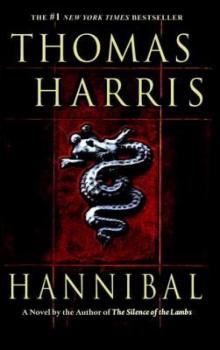 Hannibal
Hannibal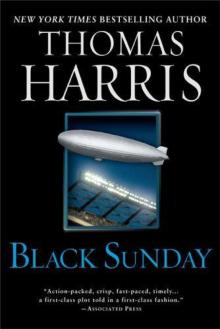 Black Sunday
Black Sunday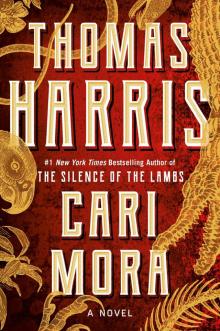 Cari Mora
Cari Mora Hannibal Rising
Hannibal Rising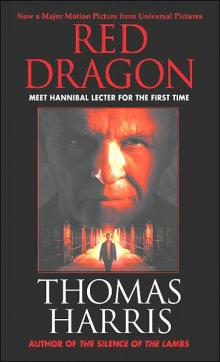 Red Dragon hl-1
Red Dragon hl-1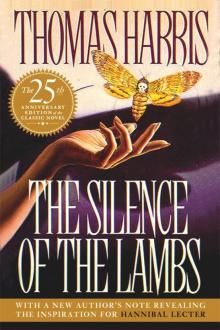 The Silence of the Lambs (Hannibal Lecter)
The Silence of the Lambs (Hannibal Lecter)